A little gem from Finland. A blind Lutheran priest takes on as an assistant a paroled murderer, Leila. Father Jaakob has a reputation as an intercessory, I.e., he prays for people and offers advice to those who write to him. While no time period is given it looks like the 1950s. He lives in a forest near a church on a lake. Nature dominates the time and the day.

His only contact with the outside world is the post and the postman. The pastor has long since given up preaching because of blindness, and he lives for those letters.
Leila is angry at the world and makes no effort to cooperate though she is glad to be out of the slammer. She is neither particularly bright nor attractive, and expects people to dislike her. They oblige in the person of the postman.
At first she thinks either the priest is shamming or is a fool. In time she comes to respect, if not share, his faith in a meaningful world. Or so I surmise because the dialogue is like much from Finland, practical and not introspective. And there is little of it. Much is told by the camera.
She also realises that he needs her if he is to live – she reads the letters to him and he needs those letters, just as the writers need him. And she also learns she owes not only her freedom to him, but more, too. No spoiler. His previous letter-reader left for the city to take care of grandchildren.
For some reason never explained the letters dry up and that brings the needs of each to the forefront. Earlier she destroyed some of the letters and perhaps his consequent failure to respond to those, discouraged others from writing. It is not clear, nor need it be. Little of life is that, clear.
In fewer than eighty minute there is more about life in this film than the latest CGI-infected three hour Hollywood brain-buster.
 Klaus Hãro, the director.
Klaus Hãro, the director.
It earned place on my list of Finnish movies along with
Leningrad Cowboys (1994)
The Man without a Past (2002)
Vares (2004)
The House of Branching Love (2009)
Rare Exports (2010)
Midsummer night’s tango (2013)
Top marks must go to ‘Rare Exports.’
Ian Samson, Death in Devon (2015)
This krimi is a light-hearted romp through distant Devon. This book is second in series not first. My mistake.
Our hero, Sefton, is amanuensis to Morley, an H. G. Wells-type, in 1938. The know-it-all Morley is author of endless titles including a series on English counties. Nice set up.
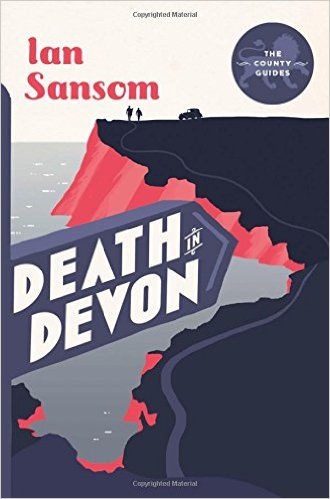
They fetch up at a school where Morley has been invited by an old friend to give a lecture, and there they find strange doings. Alex, the handsome and confident head teacher, has a plausible explanation for everything, but, still, Sefton has doubts. He also is jealous of Alex’s designs on Miriam, Morley’s daughter, who drives the Lagonda on these excursions. She, for her part, seems to welcome these designs.
There is a death, claimed to be an accident, of one of the school boys. Animals disappear from a nearby farm. Strange noises in the night are reported.
Sefton is, of course, right, and for all his blather Morley is quick thinking and acting in the crisis.
That makes it sound better than it reads, I confess. Many, very many, altogether too many of the pages of the first two-thirds of the book are given over to Morley expatiating on endless, irrelevant subjects. Exhausting. Pointless. Did I say, tiresome. Morely is an expert on everything and has to prove it minute-by-minute.
At the outset I compared him to H.G. Wells because of that know-it-allness, and the endless list of his book titles, but he is not as pompous and self-important as I suppose Wells was. I say that because I suppose some of Wells’s book have an autobiographical element, e.g., ‘The New Machiavelli.’
The three principals are likeable, the set up is clever, and the place, Devon is different. There is some mis-direction about those caves that keeps the suspense alive. But Morley droning on, while Sefton mentally footnotes the drone to his list of publications, is deadening.
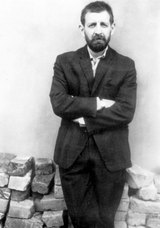 Ian Sansom
Ian Sansom
Loved his bad books library series set in Northern Ireland.
‘Dag Hammarskjõld: A Life’ (2013) by Roger Lipsey
In sum, this book, despite the subtitle, offers very little about the boy, adolescent, young man, or adult. Hammarskjõld was born to the purple. He grew up and lived most of his life to twenty-five in a palace in Uppsala, that being the official residence of the provincial governor, his father. However the book is excellent on his tenure at the United Nations.
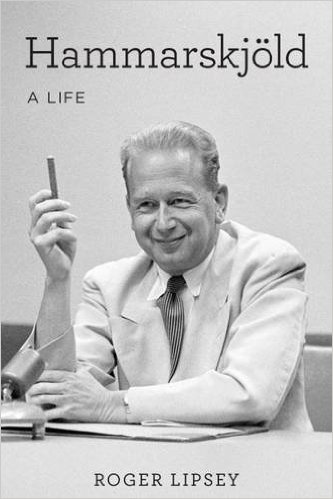
He had little international experience but some on a Marshall Plan Committee as an economist. Because Swedes did not receive Marshall Plan monies they were trusted to allocate and manage it. Hammarskjõld had been an economist at the Bank of Sweden and done some international negotiating.
There is nothing about his life, experiences, or attitude to World War II. Why and how he learned English is not discussed. He also spoke German.
Trigve Lie from Norway was the first Secretary-General and he had taken sides in the Cold War, though he wanted a second term, the Soviet bloc was alienated.
The next Secretary-General had to be a neutral. The less experience the better, so as not seen to be committed or to have baggage.
Hammarskjõld entered as completely into the job as if he were entering a monastery. He sworn and oath to the Charter which thereafter he carried on his person for ready reference, yes, but also as a document to venerate. There is a spiritual quality to his commitment.
No women. No significant other of any kind. Though many rumors about homosexuality.
His life was monastic. He got by on three to four hours sleep most of the time. In a deep crisis like the Congo, less and in quiet time little more.
At the United Nations he relied heavily on Ralph Bunch, first for internal administration and management and later as a deputy diplomat. (Maybe I should read about Bunch, this extraordinary individual.)
‘Markings’ Hammarskjõld’s personal notebook reveals the spiritual inner man who communed with the writings of medieval Christian writers. Much of this book and consists of musings on Hammarskjöld’s musings in ‘Markings.’ Hundreds of pages. All too much musing and not enough narrative.
Hammarskjõld had tall poppy cutters in Sweden who made career out of criticising him. Newspaper editors, who extended their animosity to berating the posthumously published ‘Markings.’ It is good to know that Australian media ethics are in such good company in the gutter.
Some of Hammarskjõld’s speeches are fabulous. Lucid, clear, targeted at the next step, infinitely patient, aware of the pressures on others, but punctuated with some elevated words to inspire. He seems to have gotten better and better at this rhetorical skill in the UN. It is not something he had any previous experience or preparation to do. They read well, though I have no idea how he delivered them.
Hammarskjõld more or less created the role of the international civil servant, and reflected on that, especially in the in-house speeches and reports to UN staff.
He had some successes in meditating conflicts, like the Suez Crisis in 1956. Then came the big one.
The Congo consumed him even before he died there. The endless fragmentation, the intervention of Europeans to support the Belgians who did not want to leave, and the tribal and regional violence armed by the Soviets, the CIA, Belgians, South Africans…. were let loose. The single Congo became two, then three then four entities each with its internal constituencies, that is tribes, and external supporters, and all armed to the teeth.
Patrice Lumumba is the most interesting of the characters in the Congo. He was an articulate idealist who seemed to have been able partly to bridge some tribal differences. He was a rabble rouser on radio and in person. But he had no ability to work with others in committee, completely useless as an administrator, and he had no competent second to cover these things. He was a front man only with no band behind him. He could arouse a crowd but he could not lead it anywhere. His only message was to reject the Belgians and as they left the vacuum was filled.
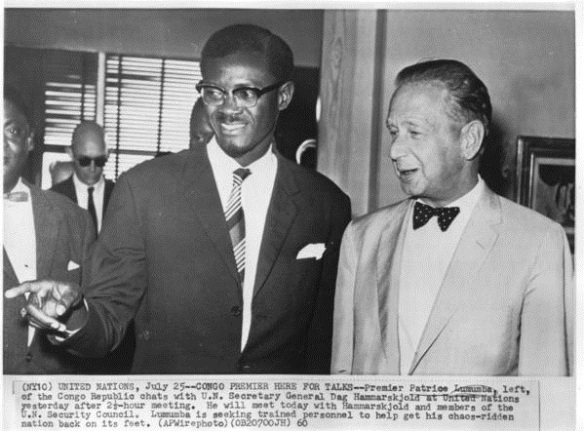 Dag Hammarskjõld and Patrice Lumumba
Dag Hammarskjõld and Patrice Lumumba
There is much about Hammarskjöld’s death. Hear-say, secondhand, and some alleged eye witnesses who feared to speak at the time and who now cannot shut up thirty years later. All the so-called doubts seem to me to be speculation. If any other death was raked up thirty years later it would be the same.
There was a lot of mission creep in the Congo, despite his efforts to limit it. It went from peace-keeping to, since there was no peace, peace-making.
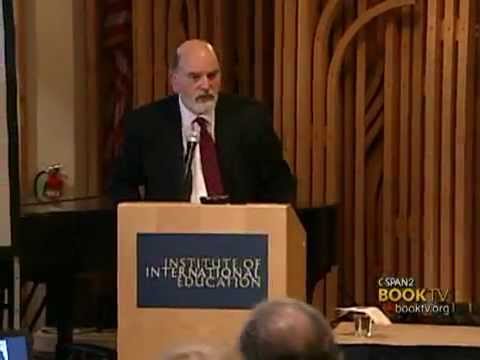 Roger Lipsey
Roger Lipsey
The book is far too long and there is just too much musing for a biography. Moreover, there is precious little biography of the boy become man in Sweden. It is a reflection on Hammarskjõld’s tenure as Secretary-General, and it is good on that. But despite the many musings on Hammarskjõld’s musings, I never did feel I was getting close to the inner man. I did feel impatient more than once.
The dissolution of the Belgian Congo was a grim story that occupied the television news every night, and it consumed a lot of good men and women. When I looked for a biography I found many on Hammarskjõld’s death, conspiracy theories, ‘now it can told,’ sort of titles that seemed to be ghoulish attempts to capitalise on his death. All in the spirit of Jim Garrison (for president) on JFK.
William Dietrich, The Trojan Icon (2015)
This is the eighth outing for Ethan Gage that energetic Eighteenth Century rogue. While I have enjoyed most of the books in the series, once again I had the feeling that the the wind is leaving Ethan’s sails. This title is much slower and more serious than its predecessors. Ethan does not sparkle. He worries a lot. The word ‘again’ refers to ‘The Emerald Storm’ (2012) which seemed more a forced march than a romp.
![]()
Moreover, the narrative is divided between Ethan and Astiza, his wife, and she is even more serious than Ethan has become because she worries about their son Horus (Harry) who also has some chapters, consisting chiefly of him worrying about his mother. There is a lot of worrying. These three worry enough to be Op-Ed writers, that professional worrying class.
The technique of alternating chapters with the voices of Ethan, Astiza, and Horus slows the pace a lot. And it is distracting. Especially Horus, the eight year old whose range is, well, that of an eight year old.
On the other hand there are vivid characterisations of the many individuals and the places that Ethan meets and traverses but once again it was too much, St. Petersburg and the Russian court, Poland and a revanchist noble, Istanbul and the the harem in the Topkapi. Indigestion, I cried. All of this name and place dropping is not a substitute for élan, spirit, movement, and fun.
Yet for all the movement there is none of the pace that I have so enjoyed in some of his earlier titles in this series. In these pages the movement is punctuated by long periods of rest and relaxation. and, of course, worry.
One character drops out of the story half any through, namely the Russian prince, whom I keep expecting to re-appear, as others do in this novel and have in the others in the series, else why have him in the first place. Answer: a plot device.
It is peopled with some truly malign villains, von Bonin and Count Dalca. Neither one is a quitter, that is for sure.
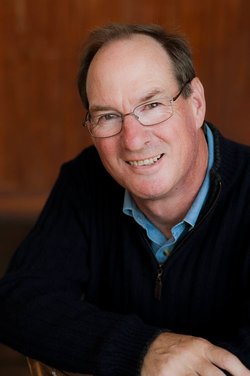
The eight Ethan Gage novels.
1 Napoleon’s Pyramids (2007)
2 The Rosetta Key (2008)
3 The Dakota Cipher (2009)
4 The Barbary Pirates (2010)
5 The Emerald Storm (2012)
6 The Barbed Crown (2013)
7 The Three Emperors (2014)
8 The Trojan Icon (2015)
I found ‘The Emerald Storm,’ despite its exotic setting, to be forced as I found this title to be. I read this one on the Kindle. I do hope the author consults Alfred E. Neuman before he writes the next one follows Neuman’s timeless advice ‘What, me worry?’
Non-entities to the left and to the right.
The increasing polarisation of politics in the United States has many consequences that are less visible than the entertainers vying for presidential nominations.
One long term consequence that has infected both Republican and Democratic administrations has been the selection of appointees. More than once able candidates have demurred or declined, while still others have been blocked in the Senate, or raked over the coals there so comprehensively that it becomes impossible subsequently for them to do the job. The Cold War custom of appointing as Secretary of Defense someone the other party, i.e., a Democratic President appoints a Republican as Defense Secretary has become nearly impossible. For a Republican to accept an appointment in a Democratic administration is now Tosca’s kiss. Secretaries of the Treasury were often appointed in the same way. But no more. As were ambassadors to particularly important posts. There was in short a bipartisan approach to some matters regarded as above politics.
It is routine for the fourth or fifth choice to be selected, because choices one through four feared the nominating process.

The endless media scrutiny starts long before the name is finally said, ignited by rumours and trial balloons. That however is nothing compared to securing the advice and consent of the Senate. Whereas for several generation the norm was that the President choses, and the Senate advises what it thinks, and then consents.
Not so any more. The threat that the Senate will not consent is palpable. Each side will say the other started it.  The Senate playground.
The Senate playground.
Every Republican Senator knows that to vote for one of President Obama’s nominees will stimulate an attack from the Tea Party, and may lead to a challenge from within the Republican Party. Senator Richard Lugar cooperated with the Obama administration to speed the disarmament of Soviet missiles left in Eastern Europe, to keep them out of the wrong hands. Seemed like a top priority at the time. Still does. But Lugar was a Republican and when he came up for renomination his Republican rival painted him as Satan incarnate for supping with the black devil in White House, and he won. So ended Lugar’s career. By the way the same was true for Democrats during the Bush Administration, but it was less conspicuous.
The unspoken fact is that one president after another has chosen to avoid such a confrontation by selecting a certain kind of candidate. Since all this has come up, again, about the Supreme Court, let us take that example.
Whereas Supreme Court nominees were once leaders in the judiciary with widely quoted opinions, long and closely argued articles in premier law journals, keynote speakers at the most important legal conferences, reputations for analysis….and more. Not so any more.
The paper trail of such outstanding candidates is rich pickings for someone willing to misconstrue, misinterpret, and de-contextualize everything to settle old scores and to embarrass the nominator.
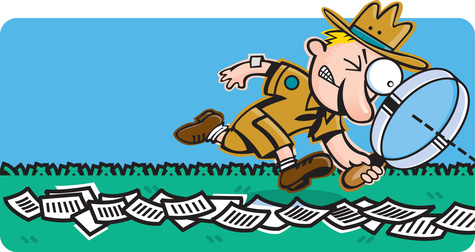
The result is the routine selection of candidates with a small paper trail because they are a smaller targets, not because they are better jurists.
This preference for ever smaller targets is now commonplace. The more obscure the candidate the better. While the Supreme Court is the big ticket in this game, it is not unique.
Cabinet appointments can also be vexed, as plenty of recent examples have shown. That the Senate consented to Hillary Clinton or John Kerry is due to their service as Senator. Like the media, the Senate does not (yet) eat its own.
Barbara Pym, ‘An Academic Question’ (1976)
Another gentle comedy of manners set among the red bricks of an English provincial university. Our heroine is Caroline, Caro, and her husband Alan Grimstone, who is a lecturer in anthropology at the aforementioned university. The social manners and morēs are very 1950s, though the time is the 1960s. The women are wives and the wives are housewives. Only widows and eccentrics are permitted to be exceptions.

Caro has little to do. Even less than some other faculty wives, because Alan does his own typing, in part, because he is secretive about his research. He is in competition with Professor Crispin Maynard who is head of his department in a narrow field of study, or so Alan thinks. The professor is more concerned with his grandchildren and dogs than with off-prints.
To fill in her days Caro reads to inmates at a nursing home, to call it by its right name, and one of them the Reverend Stillingfleet spent many years in Africa where he wrote notes about the natives’ manners and morēs. By using Caro’s reading as cover, Alan snitches one of Stillingfleet’s notebooks. It contains valuable data which he immediately incorporates into a journal article manuscript, the argument of which undermines the professor’s own work in the field.
Alan does offer the professor the opportunity to read the draft manuscript, but what with grandchildren and dogs, he declines. The clouds gather.
While Alan and Caro are still in possession of the notebook, Stillingfleet dies. Returning the notebook nows seems impossible so Caro keeps it, and Alan acts as if he does not know that, though of course he does.
Alan submits the manuscript and, voilà, it is accepted. If only it was ever that fast and easy!
He goes to London to correct the proofs to speed the process even more.
Caro moons around, wondering what to do with herself. She does not want a part-time job at the university library, which Alan thinks suitable, because she does not like the people in the library. She considers work in a jumble shop, but Alan does not find that suitable. This is a time and place when women often were introduced as ‘Mrs. Alan Grimstone,’ without even their own given name being, well, given.
She wonders if Alan is unfaithful to her, since he is often out at nocturnal seminars, and those trips to London to correct the proofs do go on. There are temptations in Iris, Inga, and Cressida.
She has some friends but they get on with their own business. Coco, Kitty, and Dolly, each seems to have a better grip on reality than Caro and they do buck her up from time to time. But well, Coco is a man who is apparently asexual, and with his mother, Kitty, together mentally they still live on the Caribbean island surrounded by servants as they were when Kitty’s late husband was governor, and so they are not entirely reliable. There is ever so faint an indication that Coco is homosexual. Dolly, who is Kitty’s down to earth sister, is the most practical person in the book, but she is rather obsessed by the life, loves, and deaths of the hedgehogs that inhabit her rambling garden. Any personal confidences shared with her inevitably are compared to the doings of the hedgehogs, which Caro finds rather…..
Alan admits a dalliance in London with Cressida, and expects their life to continue as before. He is man of his time and place, he cannot make tea, make a bed, prepare toast, etc. After retreating to stay with her mother and then sister a few nights, Caro returns to Alan and nothing more is said of the dalliance. Stiff upper lips and all that.
Alan’s paper is published, Maynard writes a rebuttal. Stillingfleet’s manuscript is lost to an accidental fire in the library to which he gave his papers, but the war of words between Alan and Maynard goes on in the pages of the journal, while they invite each other to tea at home and talk of the seasons. All very civilized.
Along the way, Alan asks Caro to do some typing for him, and she greets this as bridge between them. She will now be permitted to help him and take an interest in his work. He means it that way, and she takes it that way. I took it as satire.
Caro returns to the nursing home to read to others, and finds another elderly person with a trunk of papers….
There is a reference to Miss Clovis from Pym’s earlier novel, Less than Angels (1955). Some incidents seemed to set up for development in later novels, but this was her last.
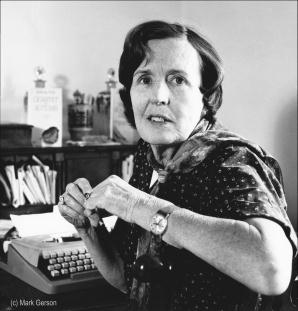 Barbara Pym at the typewriter.
Barbara Pym at the typewriter.
The telling probably deadens it but in the reading it is light and breezy, and any members of a university or college department will recognise the types, the ambitions, the moans and groans of a nine-hour a week work-load, the quiet desperation of some women to breath in the manners and morēs of the time and place, the restive students….
Martin Limón, ‘The Joy Brigade’ (2013)
This is the eighth title in the adventures of George Sueño and Ernie Bascom, Crime Investigators, Military Police, United States Eighth Army, South Korea in the 1970s when the Cold War was often very hot. Sueño is the thinker of the two, while Bascom resolves most problems with his fists and sometimes with an illegal hand gun.
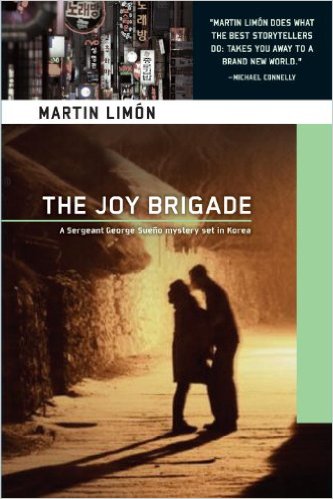
Having read the previous seven titles over a number of years, I had noticed that North Korea never figures in the books. The villains are inevitably Americans and South Koreans in some combination. Not so in this title. The setting is North Korea.
Sueño has agreed, for reasons of his own but as always involving his first friend, to go into North Korea undercover. Whoa! How can this 6’ 2” American G.I. go undercover in North Korea! Limón contrives some pretty clever ways and means to explain that. They hinge on (1) the isolation of North Korea and North Koreans from the wider world and (2) the tyrannical nature of the regime.
Because North Korea is so isolated, North Koreans, even North Korean police, reason from the propaganda stereotypes the regime has drummed into them for thirty years at the time of the story. Americans are blond-haired and blue eyed with enormous noses. Sueño is a Latino, big, yes, but dark with a cute little nose.
In this tyranny every mistake and failure is greeted by maximum punishment. Not only will the erring official be executed but so will be two generations of his family, his parents and likely his in-laws as well as his own children. This terrible possibility is around the corner for anyone. Just read the news today to realise that is still the practice. Consequently, no one reports anything if it can be avoided, because there might be a mistake. The best way to avoid mistakes is to do nothing. Sueño trades on this reluctance to admit trouble.
He has some tenuous contacts in the North who, also for reasons of their own, cooperate. That standard trope is vividly realised in the case of Kang, but credulity is stretched. Kang gets away with too much and is too conspicuous for the suspension of disbelief. He leaves a trail behind him even Dr. Watson as played by Nigel Bruce could follow but no one is able to follow it. Go figure.
Now inaction may be the safest course, but safety is not guaranteed so the North Korean black market offers a service to officials who realise something is wrong but do not wish to report it through channels. They can hire unofficial fixers who will solve the problem for them without leaving a trail. These fixers are often police officers moonlighting, and in these unofficial investigations they are even less constrained than they would ordinarily be though they, too, have to be careful to cover their tracks from their own superiors, usually by splitting the profits and glory.
The portrayal of North Korea in the book is, to say the least, Orwellian. There is the chanting of slogans of praise to the Dear Leader. There is the robotic obedience to imbecilic commands. There is the starvation of most people amid the lavish luxury of the elite. It is enough to satisfy even Ted Cruz.
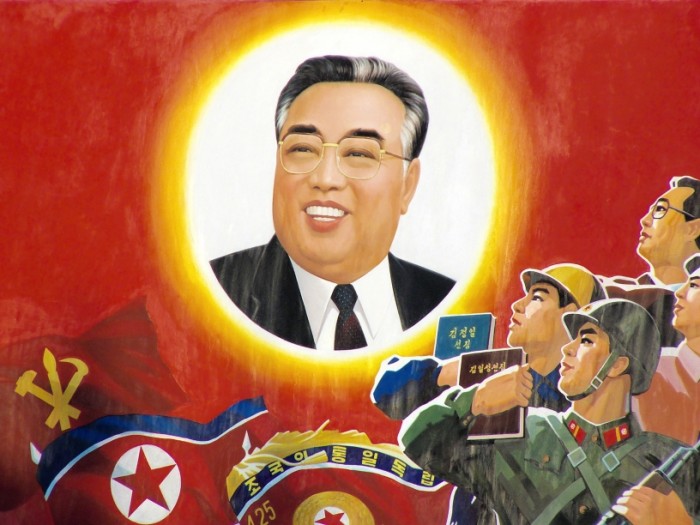 Kim Il-sung
Kim Il-sung
Sueño’s cover is that he is a Peruvian sailor with the papers to prove it working on an Albanian ship distributing and collecting cargo along the west coast of North Korea.
That he understands and speaks Korean from long study during his many years in South Korea gives him a double advantage. The first advantage is that he understands what he hears and reads. This advantage is multiplied by the second advantage which is that no North Korea can believe a foreigner understands, still less, speaks Korean. They have been told for so long how unique and special North Korea is, and how barbaric and backward the rest of the world is, that a foreigner is barely human in the eyes of most. In his private moments Sueño compares that attitude to the disdain Anglos showed him when he grew up Latino in East Los Angeles in the late 1960s. It is the same at bottom but it is magnified a thousand times in North Korean.
The plot is, well, fictional. Spoiler alert! The conceit is that a division the North Korean army wants to overthrow the Government of Dear Leader but needs the help of the US 8th Army to do so. Sueño is supposed to convince the 8th Army to hand over fuel, medicines, food, ammunition, and weapons to this division to enable it to do so. Huh! A sergeant is going to convince the 8th Army Command to risk starting a war by violating the DMZ, and in so doing will tell the South Koreans what? Pointless from the get-go.
I have not mentioned the action man Bascom because he did not figure in this book, and I find that is something of relief. In the last title or two I have read in this series I found Bascom’s adolescent temper and libido getting on my nerves.
As always with these books, the place and period are superbly rendered. There are no jarring anachronisms or cultural slips. The characters are each distinguished by speech and attitude, as well as appearance. There is no pointless description of clothes, rooms, or food that pad out so many tedious krimis.
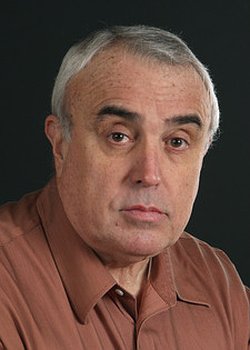 Martin Limón
Martin Limón
When I taught a semester at Korea University in 2004 the director of the Korean Studies Department told me that a reunification of the Koreas was inevitable and would be catastrophic for all concerned. He meant that it would happen one day, and when that day came no one would be able to moderate, slow, temper, channel. or resist it. He also meant that the regime in the North was fragile and could shatter at any time, probably due to starvation. Finally, he meant that the people in the North were creatures of the regime in a way that East Germans were never creatures of the DDR. This last is the most interesting and telling point.
The isolation of North Korea has been much more complete and effective than that of East Germany. East Germans were exposed to radio and television, first from other Warsaw Pact countries and through them to even more sources. In East Berlin they could literally look into the Western World. There was also exposure at a personal level in East Germany through visiting tourists from the West as well as other Soviet Allies. Most East Germans could get West German television programs at home if they dared to adjust their sets. And so on. There were many cracks in the walls around East Germany. Not so North Korea.
The jamming of radio and television and the language barrier to Chinese and Japanese precludes the taint of the airwaves. The kind of punishments dished out routinely in North Korea would discourage anyone from adjusting a television set, not that anyone in North Korea owns one. That is the most important insulator, the poverty and ignorance that the population is kept in. Foreign languages are not taught in part to block contact with foreign ideas and practices. They know nothing of the rest of the world but what the regime says.
Integrating the two Koreas would be far more difficult than integrating the two Germanies. The North Korean regime would have many diehard loyalists, and not just from the elite, who would not readily forsake it. There would be no comparable flood of North Koreans willingly leaving North Korea for the South as East Germans flooded from East Germany to West Germany overnight.
The North Korean regime might collapse due to starvation or a palace coup but then nothing might happen, no one would move. The pressure on South Korea to act would be great, largely from its own population but if South Korea entered the North, even bearing food, there might be armed, if disorganised resistance…. a grim picture, the more so when nuclear weapons are available.
Väinö Linna, ‘Under the North Star’ (1959)
One of the classic sagas of Finnish literature detailing life in a village in the period 1884-1907 as a microcosm of Finnish history of the period, which I read as homework for our planned short visit to Helsinki in September 2016.
It is earnest and documentary in style. We start with Jussi who works hard as the handy man at the parish manse and in his spare time drains a swamp, and with the verbal agreement of the vicar farms it.

All readers know, as Jussi suspects, that the verbal agreement will be insufficient when tested.
Much of the book is like this. It sets up situations that any reader can see unfolding.
The message is clear, the underclass always takes it on the chin, and the underclass is always Finnish, and even if the overclass is, in the village of Pentti’s Corners anyway, Finnish they hold the position because of Russian suzerainty of the Grand Duchy of Finland.
The language politics pervades all. The old vicar preaches in Russian and consoles the bereaved in Finnish. The local newspaper is in Russian. Finns are seldom permitted to speak Finnish.
Legal questions, like Jussi’s informal tenancy, are adjudicated by Russian law, not Finnish practice. Nor even by the rules of John Locke, i.e., ownership going to those who mix their labor with the land, which in this case would by Jussi.
A young vicar replaces the old and in time the pressure on his young family is resolved by encroaching on Jussi’s farm. The vicar’s wife is the source of this pressure, and she is a cardboard cutout for this role.
Indeed, none of the characters are rounded. Jussi is nearly a robot, who works all day and all night. Though he is credited with the vision to realize the swamp could be drained and farmed, that seems to be limit of his imagination, and that limit is enough for the plot. A little too pat, I thought.
Likewise, the other characters stereotypes from many other such stories, the talented and handsome workman who prefers to lay around scheming his next seduction, the vodka soaked doctor, the fiery tailor who speaks a garbled version of proto-Marxism from Georgi Plekhanov about the masses, the timid newspaper publisher who dares not print a word of Finnish for fear of losing the licence to publish.
The Japanese defeat the Russians in the Far East, and though not a word is said of it by any official source, and not a word published about it, still everyone in this remote village knows it. Yes, I know about rumour mills, but really, most of the unschooled people in the village Linna has conceived would have no idea of the Far East or Japan.
There is also political unrest in Helsinki, including an assassination. While this is closer to home, it is still an alien world to the villagers, whose major worry is retaliation from the Russians. Rational as that is, it also seems a long bow for these rough, uneducated villagers to see cause and effect in this way with the goings on in distant Helsinki where none of them, and no one they know, has ever set foot.
The tailor Halme agitates and the vicar counsels patience. Those locals who are aware of some of the wider world suppose that if the czar only knew how badly the Finns were treated, then he would change things. This is the old Russian folk maximum, perpetuated by every czar. The bad comes from corrupt ministers around the czar, that insulation that kept the Romanovs in business for the last hundred years. (Spell checker note: ‘czar’ is a difficult word to get through the spellchecker. It would prefer tsar so I stubbornly persisted with czar.
When Russia revoked its commitment to a Finnish Constitution, there was a reaction in Helsinki and nationalists adopted some proto-Marxist rhetoric to organised resistance. Some of the youths who resisted were exiled and made it to Queensland in northern Australia, as chronicled in the novel of Craig Cormack ’Kurikka’s Dreaming’ (2000). Russia itself was undergoing severe strains at this time, too.
Marx was right and Plekhanov was wrong, by the way, and the villagers do not arise to seize their the fruits of their labor. Although Jussi’s son Akseli becomes a convert to socialism and that makes him a marked man. While there is no general strike, but there are plenty of strikes here and there. The natives are indeed restless and Halme continues, making suits for the squires, while agitating for a mix of nationalism and socialism, one does not dare say national-socialism any more.
There are divisions among the Finns who are united by nationalism and divided by ideology. Numerous variations are traced in debates, speeches, rallies, and confusion.
The first time the people of the village see a Russian, he comes to nail up a notice filled with threats. Not a public relations master stroke. This followed shortly thereafter by evictions enforced by mounted police who are Finns but labeled Cossacks. It is a common motif that overwhelming force will shock and awe the restive into submission, and it never works, leading to ever more force, as it does in these pages.
Though I found the novel stiff and wooden, it is also true that the author knows the way of life of the people he depicts better, say, than the social realist writers in the United States covering the same period. I have in mind Theodore Dreiser, Frank Norris, and Sinclair Lewis. There is in Linna’s pages none of the condescension that Dreiser, Norris, and Lewis unwittingly reveal while representing the downtrodden. While loud in denouncing the oppressor such writers have no empathy with the oppressed. Their reaction is intellectual, learned from the pages of books. Linna’s voice is much more authentic than any of these three.
There is no redemption for the novel in the descriptions of that north star or nature and the place: these are mechanical. I found only one playful mention of Swedish, albeit I was turning the pages very fast, but ethnic Swedes remain to this day, an exclusive caste in Finnish society, as evinced by the Finnish literature written in Swedish.
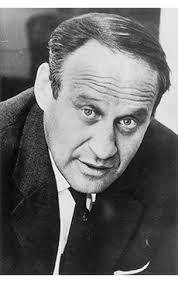 Väinö Linna
Väinö Linna
I glanced at the many laudatory reviews on Good Reads and found nothing in them to give me pause. This is volume one of a trilogy and I think I will leave volumes two and three to all those accoladers on Good Reads. Serves them right!
Madeline Miller, ‘The Song of Achilles’ (2013)
This is the story of the boy Achilles and lifelong companion and true love Patroclus from their first meeting when both were eight, told from the point of view of Patroclus and set in a mysterious world. It is ‘mysterious’ because the gods are ever-present. Max Weber said the Enlightenment had gradually ‘demystified (Entzauberung) the world,’ that is, taken the mystery out of the world through rationality and science. Well, this novel is firmly set in a world that has not been demystified. The author handles both the gods and the men and women and the goddess, if that has to be said, quite well, and also their interactions. The prose is gorgeous and the conceptions of the principals is engaging.
I made the remark about goddesses because anyone familiar with the mythology knows that Thetis, the divine mother of Achilles, was one formidable goddess. Even the the king of the gods, Zeus, had been known to steer clear of her.
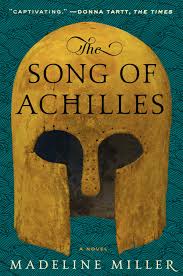
Patroclus is a foundling who pitches up at the home of Achilles’s mortal father, who takes in boys as future warriors. In a world ruled by the sword this is a wise precaution.
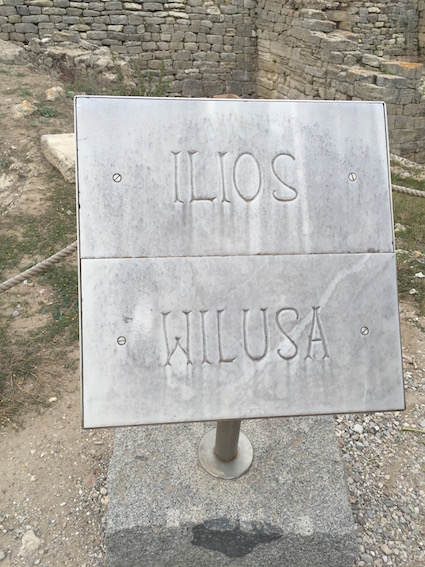 We visited the site of Troy in October 2015.
We visited the site of Troy in October 2015.
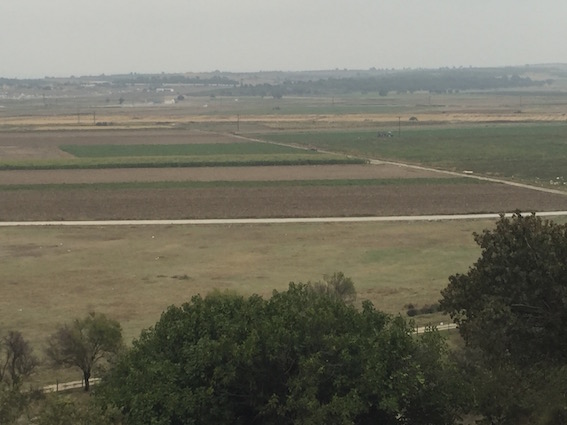 The view of the Trojan plain.
The view of the Trojan plain.
The descriptions of Achilles from boy to man are, well, Homeric, it has to be said. He is beautiful, he is graceful, he is simple in manner for there is no need for him to prove himself to himself or to anyone else, his senses are preternatural… he may work all day with sword and spear in practice and yet never seems to sweat. The abrasion of his hands on sword haft never raises a callous, and so on. Truly he is favoured by the gods.
The more so when Thetis appears, as she does, now and again and when least expected. The first time she appears to Patroclus, of whom she disapproves as unworthy to be a companion of the god-born Achilles is marvellously realised. (Ditto the last time.) The boy is walking along a mountain path when he realises all has gone quiet. The cicadas have stopped. The birds have left the sky. Even the leaves on the trees are still. The grass itself seems tense in expectation. And then…there she is, a combination of incredible beauty and searing hatred. To look at her burns his eyeballs, when she looks at him, his skin burns. Not a goddess to cross.
Though Thetis hides Achilles to spare him from the Trojan War, the wily Odysseus finds him. That is another story and it is partly re-told here afresh. She hid him among a large group of girls in female attire. Suspecting that Achilles was among these girls, Odysseus threw down a sword before them and the hand that snatched it up with blinding speed, that was the hand of Achilles. He was born to hold that sword, a reflex to grab it. The story is dressed up a little here but stays entirely faithful to the legends. Odysseus used some good old fashioned leg work to find the place where Thetis had secreted her darling boy before he got close enough to drop the sword.
There are some soft spots in the story. It is never clear to me why Achilles took up Patroclus. Achilles is asked this very question a couple of times and answers each time, but none made sense to this reader.
I also found it hard to reconcile this mild mannered Achilles with the butcher he became at Troy. Though the novel does deftly lay the groundwork to explain his double reaction at Troy, first to the loss of the girl Briseis to Agamemnon and then Hector’s murder of Patroclus. Though, strangely, regarding Briseis the author does not quote what Achilles says in the ‘Iliad,’ ‘I love her.’
Yes, Achilles knows the doom that hangs over him, and in time Patroclus learns it, too. But there is a shred of hope even amid these Western Front trenches at Troy, for the prophecy says that as long as Hector, the Trojan champion lives, so shall Achilles, i.e., Achilles will only die after Hector. Since Hector seems indomitable, Patroclus has hope that Achilles will survive, somehow. Patroclus is not a deep thinker.
Achilles faces his destiny and wades into the mayhem at Troy slaying this one and that by the dozen. He moves at five times the speed of even the most athletic opponents. Patroclus, never much a hand at athletics or warfare, stays clear of the fighting and becomes a healer, and there is much to heal. This I do not remember from the ‘Iliad.’ But the author made a choice for reasons of plot and character. So be it.
More than once ethical and moral matters rise to the surface, and are discussed by characters. The writer manages to do this without anachronism, not imputing to these men and women our Enlightenment ethos, nor condemning them for lacking it. Quite an achievement, this. Those that have not read the ‘Iliad’ do not realise how philosophical is that poem of force.
But fate is fate, and bad leads to worse.
 Madeline Miller is a high school teacher.
Madeline Miller is a high school teacher.
The novelist clearly shows that, to a degree, even within the ambit of the prophecy, Achilles is the author of his own fate. That is an achievement. Chapeaux!
Stanley Buder,’ Pullman: An Experiment in Industrial Order and Community Planning, 1880-1930’ (1967).
When doing homework for our trip to Chicago I came across reference to Pullman railway cars, a fascinating business model in itself. Those references also mentioned George Pullman’s artificial community, the eponymous Pullman. It was time to find out more.
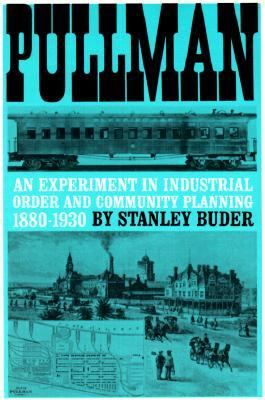
Pullman made a fortune from the railway cars that bore his name from 1867-1968.
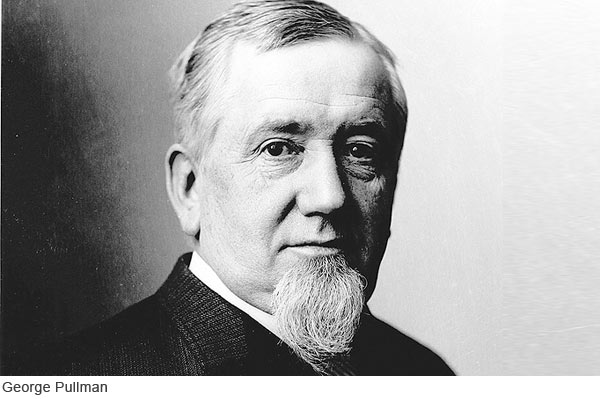 George Pullman.
George Pullman.
As railroads were rebuilt after the Civil War and extended coast-to-coast, Pullman built ever more of them and had to expand the manufacturing capacity. Because in his business model the staff of the cars was also contracted with the cars (of which he always retained ownership), he also had to recruit and train staff to maintain the Pullman standard. To do so, he bought more than 4,000 acres south of Chicago and set up a new factory and built a town around it.
To recruit first class mechanics (the term that applied to all skilled workers in his factory), to ease the commute of workers who lived in Chicago, and to satisfy his philanthropic self-image he built a community for his workers called Pullman, after the factory, not after him personally in the first instance. It would offer all the necessities and conveniences of town life from clean water, sanitation, paved streets, schools, libraries, theatres, and so on, all laid down in a plan and built before the first inhabitant moved in. There were would be no demon rum, no gambling, no prostitution and related vices.
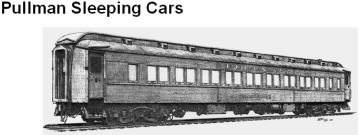
The dwellings were varied in size and the occupants rented them from the Pullman Company at a rate calculated to return 6% on the investment of building and maintaining the community, that being the return the Pullman Company realised on its other investments. This return was important because Pullman wished to prove to other robber barons that such social investment was profitable. The author found that it never did quite make 6%, more like 4.5%, something that the Pullman Company kept secret.
Pullman employees had first priority for the housing, but some others also rented there though not many because there was nothing there but the Pullman factory in the early days. The homes were subject to occasional inspections to identify maintenance needs and to insure that the occupants were taking care of them. At first the rent was extracted from salaries before they were paid, but a court struck that down in a class action. Nonetheless when paid, Pullman employees could not leave the pay desk without paying the rent.
What’s so good about utopia? The town of Pullman offered peace and quiet, recreation for families (parks, theatres), libraries and schools, sanitation, clean water, fuel, and the like, all laid on. It was run by a business manager because it was unincorporated. Ergo the residents had no say whatever in what happened. Moreover, their residential tenure depended on the Pullman Company. Furthermore, they could never buy a home there. By the way, the community included a covered market but Pullman did not have a company store, but rented space in the market to providers.
It is a kind utopian thought experiment. One can have all these good things of life in return for giving up democracy.
George Pullman was no friend of democracy, having observed at first hand its practice in the 1850s and 1860s in Chicago where one corrupt political party replaced the other by turns with mayors and councillors each more venal than the other. The corruption at city hall, ensconced by the democratic process, was matched by the drunkenness, robbery, assaults, prostitutions, and drug-taking on the streets. One neighbourhood of two thousand residents had forty bars and fifteen brothels, and more. Ruthless landlords built tenements and extracted maximum rents for rat-infested hovels. Despite the taxes collected, the streets were mud baths with plentiful horse droppings. Schools and libraries were private with stiff fees. But here was vigorous democracy as the parties battled each other in the race to the spoils. The corruption included wholesale vote rigging. Some things have never changed in Chicago. There has always been a high turnout of voters there, especially among the dead who do not care for whom their vote is cast.
To most residents of Pullman and to the journalists and philanthropists who visited the town, it was superior. ‘To most’ but not all, because some railway workers wanted to extend the union to Pullman workers to secure higher wages and to increase the security of tenure in the homes they rented. There were occasions when workers who did not meet the Pullman Company standard of punctuality, sobriety, and good work were evicted from their homes overnight. In least one case the activities of a worker’s wife caused eviction. (Use you imagination to figure it out, Sherlock.)
George Pullman reacted to these union stirrings as a personal affront to his benign paternalism. There would be no negotiation; not an inch would be given. Cometh the fall.
The railroads were the site of much of the early struggle for unions, often led by the redoubtable Eugene V. Debs. I have discussed a biography of Debs elsewhere on this blog.
At the same time the ever-expanding city of Chicago, doubling in population every ten years, was encroaching on once distant Pullman. In time Chicago incorporated Pullman into Cook County though leaving the domination of the Company largely intact for another decade.
The collision course was laid in. The Pullman Company paid high(er) wages to attract and keep good workers as well providing all of the amenities of Pullman town for them and their families. But it was a business and when competition undercut the Pullman Company it unilaterally reduced wages while leaving the rents at the established level to get that 6% return on investment. When demand was high it expected unpaid overtime out of corporate loyalty. When the bottom fell out of the demand, the Company laid off workers and if they could no longer pay the rent, then they were evicted. The union movement found increasing interest from Pullman workers. By the way, Pullman did retain employees and sell cars at a loss at times before laying off staff. But the layoffs came.
The very kind of workers that the Pullman Company wanted, these were those most likely to chaff at the control of their lives and fates in Pullman Village. They were safe, sane, sober family men who would aspire to home ownership, who would want an education for their children and taken an interest in it, who would want a social life for the housewives, who would want family entertainment, who would want and expect job security. But George Pullman would never relinquish control of anything he owned, not one iota.
The result was the Pullman Strike that went from bad to worse. While the workers offered negotiation, the Pullman Company quickly resorted to force, and was shocked to find resistance. It spiralled out of control amid much posturing. Debs called every calamity a victory. George Pullman affected wounded pride. President Grover Cleveland sent in 12,000 Federal troops, three for every striker. (President Cleveland currently ranks in my book as the worst incumbent.)
The overkill of the corporate and political oppression galvanised public opinion against the Pullman Company. Religious leaders, newspaper editorialists, and even Chicago businessmen blamed the Company, not the strikers. George Pullman found himself ostracised among the business elite and that made him more stubborn. It became a test of wills, one he lost.
In the long aftermath, the Illinois Supreme Court ruled that the Pullman Company must divest itself of the town. The annual Labor Day holiday in the first week of September was one of the concessions to the union movement from this strike.
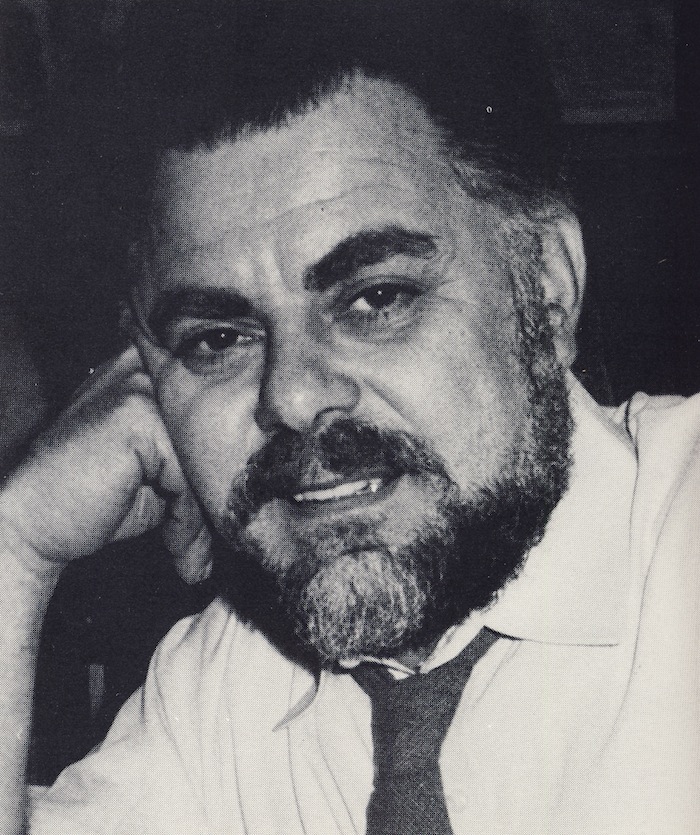 Stanley Buder.
Stanley Buder.
After a hiatus, the Pullman Company survived but was never the same again.
Nothing is said about race, but many members of the over-the-rail staff of Pullman were black. There is much else in the book about the business practices of Pullman which I found of interest. For that, read the book.
